The Checker Maven
The World's Most Widely Read Checkers and Draughts Publication
Bob Newell, Editor-in-Chief
Published every Saturday morning in Honolulu, Hawai`i
Noticing missing images? An explanation is here.
16th Anniversary Edition

It's the 16th publication anniversary for The Checker Maven! And for this anniversary we have something very special: a master level problem composed by world-class champion checkerist Alex Moiseyev. You'll find it all just below.
But first, a big thank-you to all our readers. Without you, we never could have published for so long, and we invite you to look forward to as many more years of publication as health and wealth allow.![]()
Migration
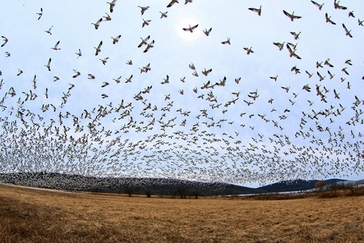
The Checker Maven has little in common with species who migrate often. But we are due for a different kind of migration.
Our website hosting company is moving us from an old server with old versions of software to a new server with new versions of software. Sounds good? Well, it turns out that our publishing platform, Nucleus CMS, needed a major update to even run at all on the new software.
It took us many hours of work, but we've prepared everything for the server move, and we'd like to hope it will go smoothly (famous last words). Now, the hosting company isn't able to tell us just when we'll get migrated over. We guess it's supposed to be some sort of surprise, which with computers is never a good thing.
We'll do our best to keep everything running as it should, but please help us out by telling us if you notice anything that doesn't work or doesn't look right, no matter how small. Please write to us at bugs@checkermaven.com. Mahalo for your support of The Checker Maven.![]()
50th Problem Composing Contest
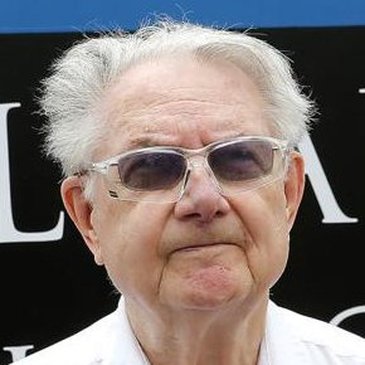
Mr. Bill Salot
Today (March 21, 2020) marks the start of Bill Salot's 50th Unofficial World Championship Checker Problem Composing Contest, which can be found on the American Checker Federation website.
Mr. Salot has long been an inspiration to us (and is indirectly responsible for our decision to continue publishing The Checker Maven beyond our initial 15 year run). He has reached age 90 without skipping a beat or seeming to slow down in the slightest.
Mr. Salot's eight-year long series of competitions has brought us a wealth of modern checker problems of amazing depth and quality. Each contest is eagerly anticipated by solvers and composers alike. Mr. Salot was kind enough to grant us an interview on the occasion of this milestone 50th event.

What gave you the idea for these contests in the first place?
It developed over a long period of time.
During my teen age years, in the 1940s in Detroit, I learned that tournament play was hard work while composing problems was fun. The latter became my primary hobby.
By the 1960s, I was corresponding with great composers. We freely shared many original problems, and published our best in the checker journals of the day. Occasionally our problems appeared side-by-side, and I found myself comparing them to determine which impressed me most.
I passed on to my composer correspondents the idea of side-by-side competition, and they liked it. A series of contests was born. We composers agreed to my publishing small groups of our confidential, original, unpublished problems along with requests for readers to rank the problems and mail me the results for publication.
Most , if not all, of the judges in a given contest ended up being the composers who did not happen to have a problem in that contest. They rotated between competing and judging. They included Ben Boland, Tom Wiswell, Joe Charles, Saul Cass, Milton Johnson, Floyd Brown, a young Melvyn Green, and others.
There were more than 30 such contests in the late 1960s and early 1970s. You can find them recorded in the ACF Bulletin and Elam's Checker Board, a few in the English Draughts Journal and a New Zealand publication.
The contests died out partly because of composer burnout and partly as a result of my parents' illnesses, together with a change in my responsibilities at work. I then dropped out of checkers for more than 35 years.
I woke up when a friend told me that nowadays chess and checkers are played on the internet. He gave me a couple of web sites. On the front page of the ACF site, previously published problems were periodically displayed. I thought, what a fine place that would be for a composer to display original, unpublished problems!

Later somebody posted, on the ACF Forum, a survey question complete with means to cast electronic votes. I saw that would be a great tool for reviving problem composing contests. Eventually Jason Solan set up a contest page and taught me how to administer it. The first contest then took place in January 2012.
How would you describe or characterize the way the contests have been received by the checker community? What sort of feedback have you gotten?
The number of returning visitors to and participants in each contest probably rivals the number of visitors and participants in most checker forums. In my infrequent ventures into tournaments, I get unsolicited positive comments and encouragement, never anything negative. The same is true for voting correspondents. So I would say the contests are generally well received by the checker community.
But composers tend to be more critical. They dislike problems that may be similar to published play, or seem undeserving of the votes they received, or are too unnatural in appearance, or too simple, or too laborious. Composers are sometimes sensitive to how problems are selected, or how solutions are presented, or how slow the contests are, or how few participate. I think all these criticisms are constructive, and the contests have improved as a result of them. I believe competing composers are generally loyal, have compositions to spare, want to win, and when they persist, eventually do win, while generally accepting losses along the way.

What do you see for the future of these contests? Do you plan to continue them indefinitely?
Yes, certainly continue them indefinitely! The backlog of original, unpublished problems has not run out. The contests should have some time left. After all, I am only 90. But eventually they will cease, unless and until somebody else wants to give them a try. So far there have been no applicants.
Problem composition is a true art. Have you seen this art develop over the course of the first 49 contests? How would you characterize today's problems compared with past history?
Problemists feel like artists, even when not recognized as such. But isn’t that true of any avocation? Yes, the quality of the contests themselves have continuously improved, thanks to preliminary reviews, private discussions, computer-driven enhancements, and old-fashioned competitiveness. I can’t emphasize enough the powerful influence of computers on today’s problems. They not only catch unsound analysis, they spring incredible surprises that seed new problems, many of which should be at least partially credited to the computer. The computer is the difference between history’s unsurpassed gems and masterpieces versus today’s new twists that would not exist without the computer. The computer is to problem composing what fracking is to natural gas production.

Any further thoughts or comments? Any stats you'd like to share?
Statistics are a boring waste of time unless they tell you something you didn't know before. Many stats on past problem contests (2012 - 2019) are posted at the web site. They are also in the annual Year in Review" articles on the ACF Forum.
Let me mention a few things that the contest statistics have taught me, or I should say humbled me.
1. One well-known player warned that the problem composing contests would not get off the ground, if previously published and flawed problems were not screened out beforehand by reviewers with huge databases. He was right. The first year, 7 of 30 problems entered (>23%) were disqualified, including the winners of 2 contests. A call went out for willing reviewers with large databases. A team was formed that is still intact. Only one problem was disqualified in 2013, one in 2014, one in 2016, one in 2017, and two in 2018. So 6 of 191 problems entered after 2012 (<3.2%) were disqualified. That’s not perfect, but not bad.
2. Another well-known player recommended that the contests not include problems that were 4x4 or smaller. He warned that almost all ideas possible in positions that small have already been published. He apparently was mistaken. Of the 215 problems not disqualified in Contests 1 through 48, 66 (>30%) were 4x4 or smaller. Contest 10 was devoted entirely to 4x4s; Contests 40 and 50 have only 3x3s. Such problems apparently are not exhausted.
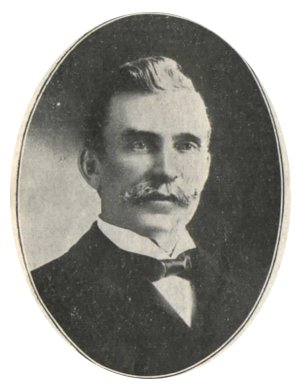
George H. Slocum
3. These contests included perhaps the rarest of all human competitions, the living versus the dead. Six times, living problemists were challenged by George H. Slocum, who died in 1914. Slocum is acknowledged as one of the greatest checker problem composers of all time. Jim Loy found a bunch of Slocum problems published in an obscure journal, unknown to our generation because they were never republished elsewhere. We entered six of them in contests, during 2016-2017, to see how they would fare against today’s talent. They all lost, which only means they probably were not among Slocum’s best efforts. After the votes were counted, each of the six Slocum problems was disqualified due to their prior publication. These problems and disqualifications were not counted in item 1 above.
4. The three contests with the most votes by far were contests 2 (35 votes) and 3 (40 votes). They made us think that the contests had exploded in popularity. But that didn’t make any sense. Those early contests had no publicity outside of the web site, and they did not run for six weeks as they do now. It turned out that a strange glitch in the voting program was resetting the voting button, implying that a vote was not accepted and needed to be cast again. The Web Master was unable to eliminate the glitch, but he did add an “I already voted” button, which persuaded voters to not vote multiple times. After that, the voting settled into a normal average of 17 per contest.
5. After years of problem composing experience and correspondence with many great composers of yesteryear, I truly expected to dominate these contests at the outset. That was before I heard of the likes of Roy Little, who subsequently won or tied for first 19 times and won Problemist of the Year 4 times, and Ed Atkinson, who won or tied for first 14 times and won Problemist of the Year 3 times. They did it all without entering every contest. I am the only one who did. In contests that Roy and Ed entered, Jim Loy and I each won or tied for first only 7 times. Leo Springer did it 5 times in 5 tries. The sum of all those wins exceeds the number of contests because of the many ties. I am especially humbled by my 6 entries that received zero votes each.
6. I believe some of the clearest indications of the contest voting statistics apply to other aspects of human life, such as politics, religion, ethics, morals, etc. Different people simply look at the same problem and see something entirely different. They often, not just sometimes, draw diametrically opposite conclusions. In 32 of the first 48 contests, every problem received at least one vote for first place. In other words, two-thirds of the time, every problem, even the worst one, is voted best by somebody. If we cannot agree on the value of something as minor as a position on a checkerboard, is it any wonder that we can’t consistently agree on real world issues?
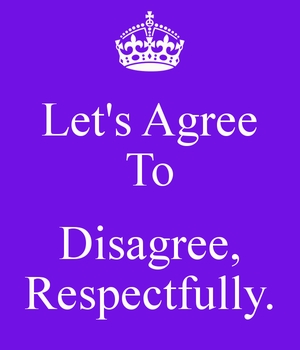
The Checker Maven once again thanks Mr. Salot for his time in providing answers to our questions, and for the opportunity to give our readers an insight into his monumental, ongoing contributions to the game. Now, as a special treat (and it's special even if you've seen it before), here is a unique problem by Bill Salot, which he originally called Don't Ask--- as in, "don't ask" how the position arose!
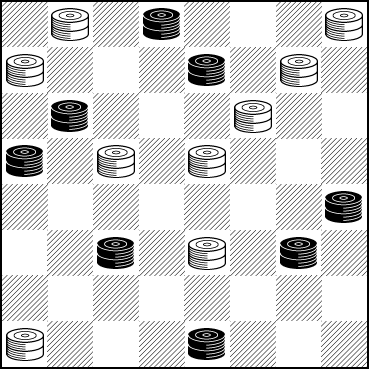
WHITE
White to Play and Win
W:WK1,K4,K5,K8,K11,K14,K15,K23,K29:BK2,K7,K9,K13,K20,K22,K24,K31
This one is really something, and we're certain you'll enjoy solving it. But if you're not able to contest it, clicking on Read More will uncontestedly show you the solution.![]()
A Coronavirus Update From The Checker Maven

Many of our Checker Maven readers are on the older side (your editor certainly is), and some of us have underlying health issues, making the Coronavirus significantly more risky.
We highly value each and every one of our readers and want you all to stay well, safe, and healthy. And so we have a suggestion.
Of course, follow the dictates of your health and emergency officials. But if you're in a higher-risk group, you can always stay home and study checkers or play online. Hopefully that will increase your chances of avoiding infection, and occupy your mind with something other than unproductive worry.
This isn't a just a flippant recommendation, and it's exactly what we're going to do ourselves if the situation here in Hawai`i worsens, as it very well might.
Be safe and well, checker fans, wherever you are.![]()
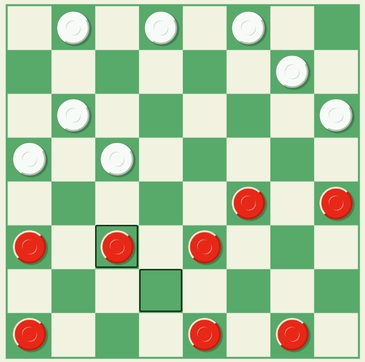
Second Immigration: An Interview with Alex Moiseyev

Alex Moiseyev, Grandmaster and Champion
In mid-March, former long-time 3-move restriction world checker champion Alex Moiseyev will face off against Italy's Sergio Scarpetta, the reigning king, in an effort to recapture the title that Alex lost a few years back.
Alex kindly granted The Checker Maven an exclusive interview, and in this column we'll learn not only more about how this historic match has come to be, but a great deal about Alex and his own personal history. You'll also find out how you can support this match directly and become a promoter of our great game as played at its highest level.
In mid-November of 2019, Alex posted the following on Facebook:
Today me and reigning English Draughts 3-moves style World Champion Sergio Scarpetta, Italy got an agreement to play World Title match via Independent Challenge channel. Match will be hosted in International Checkers Hall of Fame, Petal, Mississippi.
Match dates: March 11 (Wednesday) -- March 19 (Thursday), rest day after 16 games -- March 15, Sunday. Referee--- Charles Walker.
Financial aspect of match is simple: Sergio will receive $7,000 and I will play for title. All Sergio transportation expenses will be covered fully. ICHF will cover all accommodation and food expenses for both players.
I am working now on broadcasting coverage and looking for any volunteers who might be interesting to step forward and do online life time coverage. Stay on for more news.

Sergio Scarpetta
Alex continued in another Facebook posting:
Sergio will have unique chance to defend his title against all living English Draughts 3-moves World Champions: Michelle Borghetti (Italy)--- 2017, Ronald King (Barbados)--- 2019 and upcoming match. Kind of historical moment.
We know well from history of checkers title matches --- there were a good number of very strong challengers who never got a good chance to play match. It is probably something similar to "right place at right time." And this is main reason why I decided to move ahead with Independent Challenge--- now or never!
Alex then wrote to offer us the opportunity for an interview. He gave us the following opening statement.
I want personally to thank for interview Bob Newell--– Main Editor and owner of terrific, fantastic checkers blog which recently celebrated 15 years anniversary. It is my honor and pleasure to answer on his questions, share my thoughts about upcoming match and checkers fate, and more, more, more!
And now, here's our interview in full!
1. Let's start out with a little about the checker history of Alex Moiseyev. We know that you came to the US from Russia, where you played the Russian variety of checkers at a championship level. How did you get into the English form of the game? How well did your skills in Shashki transfer over?
Just for the record from my checkers biography: I started playing Russian Checkers in 1966 when I was 7 years old. In 1975 at age 15 I achieved norm of USSR Master Sport. In 1979 I switched to International Draughts (10x10) where I played until October 1991 when I left Soviet Union with my family--- just a couple months before the country collapsed at the end of 1991. Should I say the country collapsed because of my departure?
Here is an image of my "Master ID" from 1975 with picture, registration number and stamp. Isn't it cool?

Soviet Union Master of Sports
For five years after my arrival in the USA I didn't play any form of checkers. I just simply didn't have time and money! It was a kind of fantastic journey in my life to fight to survive and support family. In 1996 when my life was a bit established, I started feeling that I was missing a big spot in my soul without checkers. In July 1996 I played for the first and last time in the USA 10x10 National in New York on Long Island, where I won an event (ahead of I. Kuperman!) and earned the right to play in the World Championship in the Ivory Coast.
I had already bought a ticket to Africa and had taken a very painful shot for yellow fever, but then I realized that there was no future for me to play active competitive 10x10 Draughts by living in USA where this kind of draughts is not very popular. At this moment I made one of the most important crucial decisions in my life (again)--- I made my second immigration in checkers! I cancelled my trip to Africa and in October 1996 played my first USA 3 moves National in Danville VA.
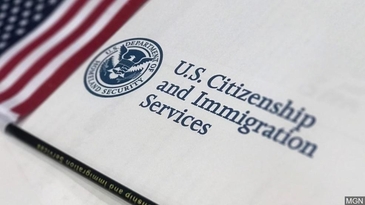
In the beginning of 1990s in USA my eldest son played chess and participated in some scholastic events. I also played few times in the Parents Division, and one of parents told me about an English Draughts and local club in New Castle PA, near Pittsburgh where I lived. My long time friend and coach was Pennsylvania's strong Master Anthony Kozenski. I played checkers in this local club in church from 1996 until 2003 when we moved to Columbus, Ohio.

Alex at the Mind Sports Olympiad in Beijing
2. You were a long-time world 3-move champion and part of what made you a great title holder was your willingness to take on all comers without fear. And although the championship resides in Italy at this moment, you remain part of a small elite circle at the pinnacle of checkers skill. In your estimation, who are the players most worthy of a chance at the world 3-move championship? And who do you think are potential up-and-comers who might reach that level in the foreseeable future?
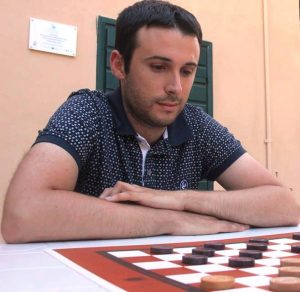
Matteo Bernini
As of today the maximum threat to the 3-moves throne is coming from a young Italian star, Matteo Bernini. He tied for 2nd-3rd place in 2018 Qualifying Tournament in Barbados (R. King was 1st, I was 2nd ). He also recently won the GAYP (go as you please) Qualifying Tournament in Barbados and earned rights to play a GAYP World title match with GAYP World Champion Lubabalo Kondlo from South Africa. I have very little doubt that eventually Matteo will be on top of things in the very near future.
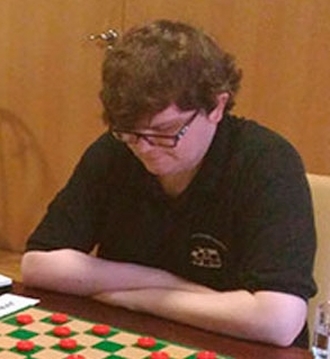
Shane McCosker
In addition I want to mention the very talented young Irish player Shane McCosker. He rarely loses a single game and not every year! His style reminds me of legendary Irish grandmaster Pat McCarthy. But Shane needs to be a bit more aggressive. If he can do this, he will be a dangerous opponent to anyone.
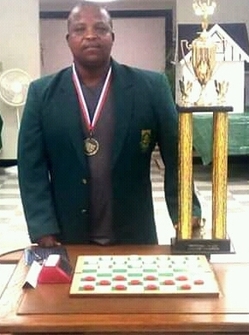
Lubabalo Kondlo
From other players who may fight for 3-moves World title in the nearest future are a couple of South African players: current GAYP World Champion L. Kondlo who already won one time (2014) in the 3 moves Qualifying Tournament and played a 3-moves World title match with M. Borghetti in 2015. Lubabalo just needs to work more on 3-moves published play.
Another potential threat is coming from the excellent South African player Melikaya Nonyukela. He tied 1-3 in the GAYP QT in 2017, He finished 4th in the 3-moves QT in 2018 and from what I've seen, he continues to consistently improve.

Melikaya Nonukela
I don't see anyone else at the moment who can compete for the 3-moves World Title in the next few years but things can change indeed!
3. You've chosen to go the route of an independent challenge for the championship, and as you've pointed out elsewhere, this is completely legitimate according to WCDF rules. Yet the "normal" route is to win the right to challenge in a qualifying tournament. How do you think the two methods compare, and why did you choose the challenge method?

Michele Borghetti
I'll answer on your second question first, because this will help us to understand better the process and make for an easy answer to your first question. First of all a bit of history: after I lost my title to Michele Borghetti in 2013, I played in all the 3-moves Qualify Tournaments. In 2014 in Louisville, USA I won 6 games, lost 1 and finished 3rd, 1 point behind L. Kondlo and S. Scarpetta. In Rome 2016 I won 6 games, 0 losses and finished second 1 point behind Sergio Scarpetta. In 2018 on Barbados I won 6 games, lost 1 and finished 2nd 1 point behind Ron King.
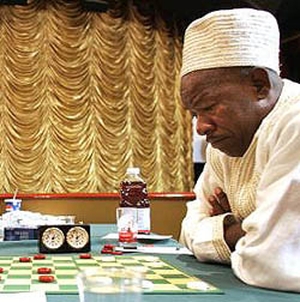
Ron King
As you see, it looks like I am becoming a "second forever" and I certainly don't want to play this role! Also scenarios and quality of games in all three events leave an open question (at least for me!) as to who is best. It is also well known from history that there are good "tournament players" and there are good "match players."
In addition, we learn from history that there were some players who didn't play their BIG match on time. You can't be "second forever" ... it's always way up or down!
And finally--- I will be 61 in February. Time is not on my side and always goes in the wrong direction!
All this together forced me to submit an Independent challenge to the current 3-moves World Champion, Sergio Scarpetta.
4. Along these lines, do you think an ex-champion who has just ceded the title should have an automatic opportunity for a rematch, rather than being asked to compete in a candidates' tournament?
No, I don't think champion should have the privilege to play automatically in a revenge match. Each time it's a very individual and personal decision from challenger and champion. As challenger you can submit an independent challenge if you think you have chances, and the champion can accept or reject your challenge with no penalty. Looks fair to me.
5. Sergio also showed himself to be a great champion by readily accepting your challenge, and you have yourself stated that he will provide tough competition. How do you plan to prepare for this match? And how do you rate your chances?
My preparation for this World Title match is standard with no difference from my preparation to other matches.
- Refresh my memory for known published play;
- Preparing new "cooks" for strong and weak sides of openings;
- Solving problems from problem books to improve my cross-board skills;
- Working on my physical form--- diet and exercises. Trying to control my blood sugar to a normal level.
- Working on my warrior spirit - raise self confidence, improve stamina etc.
I think today my chances to win this historic match are 55% vs 45%. But with all my preparation and hard work I will try to improve this number and make it more solid--- maybe 60%-65%.
6. Can you tell our readers how they can support this match and thereby support a high standard of excellence in the world of checkers?
In order to support event, readers of your blog and article can make publications in press and online media. In addition they can make donations to this event to:
- 34490 Ridge Road, Apt. 115, Willoughby, OH 44094
Please, specify INDEPENDENT Challenge Match on your check.
- Pay through ACF Store to donate to International match. Please add a comment that your donation is going to my 3-moves World title match with Sergio Scarpetta.
http://www.usacheckers.com/store/index.php?route=product/product&product_id=104
7. Are there specific publicity plans, such as live streaming, live blogging, daily summaries, etc.? In other words, how can we all stay tuned to the action?
Yes, indeed ! Mark Sokolovsky kindly agreed to perform duties of Referee Assistant and also provide services for broadcasting and online coverage for the entire course of the event. All match games will be video translated in real time on the Facebook group "English Draughts." I also plan to find someone who will copy, on a daily basis, match progress information onto the Forum on the ACF website, www.usacheckers.com.
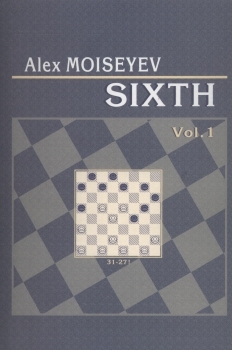
8. You're the author of an instructional book on checkers called Sixth. The book has been very well received by the checker playing community. Can you say something about this book and how our readers might obtain a copy?
I started to write this book sometime in the beginning of 2004--- just right after I won the 3-moves World Title in my historic match with Ron King in Northern Ireland, October 2003. One of the main reasons which influenced me to write this book was to mark and highlight an important period in my life and checkers career.
So, my checkers career is divided prior to 2003 and after winning the title.
While working on this book, I had an interesting conversation with one of my Russian friends and author of some books. He asked me an interesting question:
“6 months after your book will be published, people will know everything about each game and each position in this book. Why would someone need to buy this book after 20 years ?” And then he answered to himself: “Because of the insides! (insider information)” I tried to follow his suggestion.
You can order this book today from the ACF Store:
http://www.usacheckers.com/store/index.php?route=product/search&filter_name=Sixth
In the past almost decade (!) I continue working on my next book which I name as “AMG”--– All My Games. It has a collection of all the games I ever played in tournaments, matches or training events. I started it in 2006, just right after I published Sixth. At that time, in 2006, the total number of games I ever played since 1996 was around 1,300. Today it’s almost 3,000 and still growing. The volume of information is really huge and I don’t know when this will be done. It seems like a lifetime project.
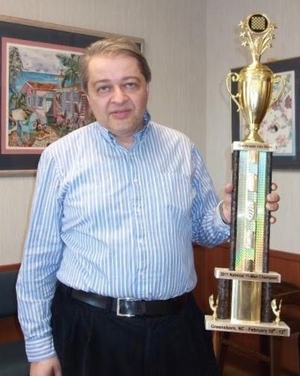
Alex Moiseyev, 11-Man Ballot World Champion
9. In addition to having long held the 3-move world title, you have also long held, and currently hold, the 11-man ballot world title. How do you compare the two styles of play. And who might be your top challenger in the 11-man game?
Great question! The way 11-man ballot style is organized--– remove 1 man from each side and make 1 move--– generates in total 2,500 unique openings. This make it almost or absolutely impossible to memorize all of them or any reasonable part. As result, the 11 man ballot style is strictly cross board style. Most positions generated by 11 man ballot style are unique and cannot occur under GAYP or 3-moves due to different tempo.
However, all strategical principles and basic rules remain in place under 11-man ballot style. There is a very famous Marion Tinsley quote: “We play only what we’ve seen!” This is very applicable to 11 man ballot style. My predecessor to the 11 man ballot World Title, Elbert Lowder, was one of the strongest cross board players ever.
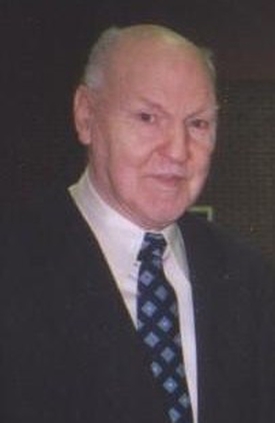
Elbert Lowder
Since 2008 when I won the 11 man ballot World Title after the great Elbert Lowder passed away, I played many World Title matches with strong players: Tim Laverty, Richard Beckwith, James Morrison, and Michael Holmes, and was able to defend my title. I am not afraid to play a match with anyone in the world (hence, it’s a small world!). But it would be interesting for me to play an 11 man ballot World Title match with Sergio Scarpetta, Matteo Bernini and Lubabalo Kondlo.
10. Do you have any interest in GAYP (go as you please) competition?
No, I don’t have any specific interest to GAYP competition. This is different game and style which requires different skills and different attitude. It looks like my personality and my skills are better matching to 3-moves and 11 man ballot types of game.
However, the great Marion Tinsley said once that GAYP openings occupy in general 1/3 of the entire 3-moves deck and you can’t be a strong 3-moves player without doing it well in GAYP.
The total number of all GAYP events I ever attended since 1996 is limited to number of fingers on both hands! I was first in the USA GAYP National in 1999 and 2003, I was 2nd after Ron King in 2001, 2005, and 2011. I played a GAYP World Title Match to a draw with Ron King in 2000 (+3-3=18) and I tied for 1-3 place (2nd in honor points) in the 2017 World Qualifer. That’s all together, and may give you and the readers some picture of where I am in the GAYP field.
11. We'd like to hear your opinion on the future of the game. Where do you think English checkers is going? Can there be a major revival? And, what advice would you give to an aspiring and ambitious player who is new to English checkers?
I have no idea where we are going and where we will be after 10-15 years, but I am pretty confident that the doors will never ever be closed--- I am a cautious optimist !!
My advice to the newcomer: it's never too late! Consider checkers as a lifetime hobby--- some people do fishing, others hunting, you play checkers! And after all, if you play checkers you are much more lucky and richer than someone who doesn't have anything to do outside of work and family.
12. Any final thoughts or comments for our readers?
I can only repeat my favorite quote: "There is only one way to prove pudding--- eat it!"
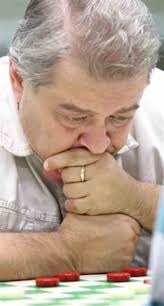
Finally, Alex shared with us a picture of his wife, Galina, and son Michael just prior to their departure for the US, in 1991. Michael was age 7 at the time. He's now 36 and resides in New York. Alex's other children, son Paul (age 24) and daughter Clara (age 20) were born in the United States.

And once again, The Checker Maven thanks Alex for this interview. We wish him the best of luck in his upcoming challenge match!![]()
The text portions of this interview are Copyright (C) 2019/2020 The Checker Maven and may not be reproduced in any form without the express written consent of either The Checker Maven or Alex Moiseyev.
Definitive Analysis of 11-Man Ballot

The eleven men above certainly aren't playing 11-man ballot or any other variety of checkers, though we'll bet many of them did surely play checkers in a slightly less risky environment.
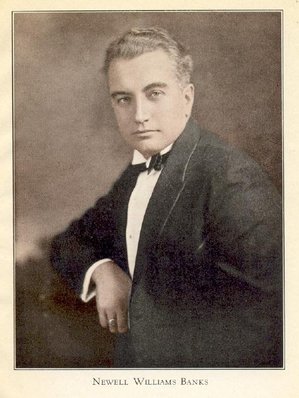
But today, our subject is indeed the 11-man variant of checkers. Created around 1907 by champion player Newell W. Banks, it provided an inventive alternative to the common "go as you please" (GAYP) style, in the hopes of lending the game fresh variety and reducing the number of draws.
In GAYP, of course, there are no restrictions on opening moves. Players indeed go where and as they please. The relatively short-lived "2 move restriction" style, in which the first move for both Black and White is chosen by lot, was played for a while in the early 20th century; and "3-move restriction" in which the 3-move opening sequence Black-White-Black is randomly selected, came just a bit later and is current today. (GAYP is also still played at the highest levels of the game.)
The 11-move ballot variant got some play and some attention but never really caught on, at least not until recently, and while 3-move restriction has been extensively analyzed, 11-move ballot has remained mostly new territory.
For a full description of 11-man ballot, you can see this link, but the basic idea is that one piece chosen at random is taken off the board on each side, and then the first Black and first White move are also chosen at random. There are some further rules and limitations, but that's the main idea. There are 2,500 independent ballots in this variation! Some are known to be dead lost (and are not played), many are clearly playable, and some are open to speculation.

Ed Gilbert
Photo Credit: Carol Gilbert
Until now. For Ed Gilbert and his mighty KingsRow computer engine have been very busy, and Mr. Gilbert has made yet another contribution to the game: he has analyzed and classified every last one of the 2,500 ballots, labeling each as won, lost or drawn for Black or White, and further, calculating a difficulty factor for all of them. This information is handily summarized in a series of tables (see links at the end of this article).
Ed has also prepared a special 11-man ballot computer opening book containing 1.1 million positions, which is now distributed with the latest download of KingsRow. He has made all of this material available free of charge on his website (again please see links at the end of this article).
11-man ballot will never be the same again.
What follows is a fairly detailed discussion of Ed's work. But first, to illustrate the depth of Ed's discoveries, take a look at the following position.
Remove 6 and 21; 12-16 22-18
WHITE

BLACK
Black to Play and Draw
B:W18,23,24,25,26,27,28,29,30,31,32:B1,2,3,4,5,7,8,9,10,11,16
This, gentle reader, is a draw. Yes, it is, requiring no less than 20 star moves on the part of Black. Ed ranks this as the toughest of all the 11-man ballots and we call it the toughest checker problem ever published.
Care to try it? You can access our no-spoilers animation here. Try to guess each Black star move and the strongest reply by White before you click the arrow to show the next move. If you can solve it, you're superhuman, but it's fun to try and will give you a real workout. If you'd rather just play through on a board or on your computer, you can click on Read More to see the list of moves.
And now let's let Ed describe his work in his own words, through a series of emails sent to us over the past few months. A bit earlier on in the process, Ed said this:

"I have finished the analysis work I've been doing on 11-man ballots.
"I have found a few more 11-man lost ballots. There are now 248 lost ballots identified by the opening book generator. This may be the exact right number, or perhaps I'm off by 1, I can't be absolutely sure, but it's been over a month of book expansion since the last lost ballot was identified, so I feel that the analysis is quite solid now. I read on the NC Checkers site that when they play an 11-man championship match, after selecting a ballot at random, the 2 players sometimes spend some time trying to determine if the ballot is playable or perhaps a loss. Maybe this analysis will at least be useful to simplify that part of the matches."
A little later on, Ed sent this update, wherein an additional ballot (the one diagrammed above) was found to be a draw rather than a white win, reducing the number of lost ballots to 247:
"Using a combination of engine matches and additional book expansion, I found that one of the 11-man openings that I had classified as a white win is actually a draw. It is ballot #2493, and a very difficult draw to be sure. When I updated the rating tables, this ballot went to the very top of the difficulty table with the highest difficulty figure of all the drawn ballots. It appears that for the first 20 moves, there is only one drawing move for black (when white plays the strongest attack)."
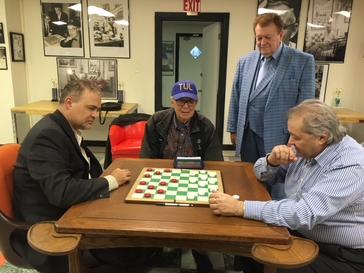
Finally, here are the details about how Ed computed difficulty rankings. To determine a reference for relative difficulty, Ed first re-analyzed the 3-move ballots and correlated various measures with the difficulty ratings assigned by Grandmaster Richard Pask and published on the ACF website (see link at bottom of article).
Warning: The following material is not for the faint of heart or the non-mathematical! (Note: The text below contains a small post-publication correction Ed sent us based on correspondence with Martin Fierz.)
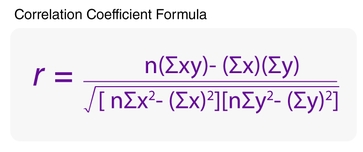
"Each position along the PV is visited, and a 5-second KingsRow search is done with KingsRow configured to use only an 8-piece endgame database. The sum of those search scores is the value used.
"By the way, I found that if I did the searches with a 10-piece database, the results did not correlate nearly as well as they do with 8-piece. Too many searches return 'database draw' using the 10-piece database, so too much heuristic information is lost that way. I should also mention that database draw search scores of +/-1 and repetition draw scores of +/-3 were given the value 0 during the PV sum process.
"'Match score difficulty' is the second rating value that is an independent input into the model. To get this value, a number of engine match games were played for each 11-man ballot. To be specific, each ballot was played for 96 games, KingsRow vs KingsRow, opening books off, 8-piece database, and blitz time controls of 0.1 seconds/move."
"This component of the model is based on a suggestion from Martin Fierz. I will paste exactly what he wrote to me, because I liked his reasoning and found it slightly amusing. He wrote, 'My feeling is that at 0.1s the engines are playing very well according to human standards, but not yet inhumanly well, so that this metric kind of approaches what strong human players would do when playing these ballots.'
"To turn the Black wins ('bwins'), White wins ('wwins'), and games into a ranking score, I used this logic:
if (bwins >= wwins)
rank = bwins / games
else
rank = -wwins / games
"I had previously tried other logic, like 'rank = (bwins + wwins) / games', but that metric by itself did not correlate as well with Richard Pask's ratings (for 3-move ballots). To put this into words, it seems that the Pask ratings are based primarily on his perception of how difficult it is for the weak side to play these ballots, and does not take into account that perhaps there are significant opportunities for the weak side to actually score a win. It didn't happen often, but you can see there are a few ballots where the weak side scored almost as many wins as the strong side.
"So we have these two rating values, PV sum and match score, and these were combined and a best fit to Pask's scaled ratings was found through linear regression. If you plot a best fit of each of these ratings to Pask's separately, you find that PV sum by itself has an R-squared value of 0.608.
"When the match score is used by itself to predict Pask's ratings, the R-squared value was much lower, something like 0.2. I also did this with the 'match score' ratings. So by themselves they would not provide a good model, but when combined it does increase the adjusted R-squared by nearly 0.1.
"The output of the linear regression module for the full model is the scaled ACF difficulty, and these coefficients are used directly to generate the 11-man difficulty ratings."
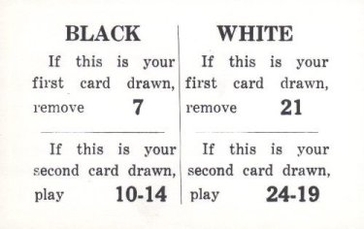
So there you have it. 11-man ballot has at long last been put on a solid footing based on detailed calculation and computer analysis. Is this the very last word on the topic? Ed himself would likely say that in checkers, the last word is never really in, but have we ever come a long way!
And some people think checkers is simple? After hundreds of years, we're still finding new ideas and exciting discoveries!
The Checker Maven thanks Ed Gilbert for the enormous privilege of presenting his work in this column. We hope Mr. Gilbert's ground-breaking efforts will serve to increase interest in 11-man ballot checkers, leading to more competition and even more analysis and publication.
Main link to Ed's work:
11-man ballot, descriptive page
The following links can also be reached from Ed's website but are given here for convenience.
Latest KingsRow which includes the 11-man ballot opening book
11-man ballot difficulty ratings in order of difficulty
11-man ballot difficult ratings in ballot number order
Reference rankings of 3-move opening difficulty (Richard Pask/ACF)
![]()
Fast Lane

Public Domain
At our Checker Maven location we're already seeing preliminary effects of Hurricane Lane and we anticipate heavy rain and high winds tonight (August 23, 2018) and tomorrow and into the weekend. If the storm doesn't make its anticipated westward turn it could track right over us.
Our offices will be closed and we could be out of touch for anything from a short while to a longer while. Publication will continue for at least a few weeks as that's all automated, and our server is on the mainland.
We're hoping for the best but we're prepared to be indoors for a while with our checker books!![]()
Not Secure

If you browse with Google Chrome, you may have noticed that for a little while now our site bears the legend "Not secure" next to the URL. Is The Checker Maven indeed "not secure"?
Actually, it's fine. We don't collect any information from you so there's nothing that needs to be encrypted or hidden away. But Google is pushing web site managers to move from the http protocol to the encrypted https protocol.
The problem for us, aside from the time it would take to make the switch, is that we'd incur almost $100 per year in additional costs, and neither we nor you would really get anything in return.
So we're keeping things as-is for a while longer. Don't worry, your personal information isn't at risk, because we never collect it in the first place.![]()
Privacy Act Notice

New privacy regulations soon go into effect in the EU and, given that we have a worldwide readership, we're publishing this privacy notice.
Your privacy is important to us. Information that we don't have can't be disclosed or stolen. To this end, and to respect your rights, The Checker Maven collects NO personal information about you.
Please note that our host provider, GoDaddy, does log data about IP addresses and pages accessed, and we have no control over their actions. (Your own internet service provider almost certainly does the same thing.) However, The Checker Maven neither accesses nor makes use of this data.
Additionally, The Checker Maven makes no use of cookies or any other such device.
But do browse safely. Unfortunately not everyone respects your right to privacy the way we do.![]()
Checkers in the Outback
A Guest Column by Kookaburra

I live in Adelaide which is the capital city of the state of South Australia and I play checkers / draughts. South Australia is quite remote as it is in the middle of Australia, and within a short distance of Adelaide is total wilderness: The Outback.

Here we have extremely hot summers with stretches over 40 degrees Celsius and winters that are mild by world standards--- no snow but a little frost. The wildlife is wonderful and unique.

I started playing chess about four years ago after a health problem and also tried a stack of other games: Backgammon, Scrabble, Four in a Row, etc., and also Checkers. Thanks to a nice and skilled checker player I met online, I became a devotee of the game.
The reality of being a checker enthusiast today is that many of us are isolated. I play checkers (or draughts) in a country where checker players are as thin as kookaburra’s teeth. This however should not stop any of us from enjoying this great and beautiful game. The fact you are reading this from far away from where I live is evidence that the tyranny of distance can be overcome.
Indeed, there aren’t many serious checker players here in Australia at all. I have made contact with a couple and hope to play them crossboard at some point. For the most part, I play online, and have met some amazing people that way. Checkers is unique in that it offers a friendly, accepting fraternity who have embraced my presence as a new player.
It is difficult being isolated but checker players are not so common any longer, even in more populated parts of the world, and so all of us are becoming more isolated. My goal is to be the best I can at this beautiful game and not worry about other people or the isolation but to focus on the game and my skills in it. Then it doesn’t matter.
One of my role models in checkers is the late Jan Mortimer, from New Zealand, who overcame the isolation of living in this part of the world to be a world class Checker player. I don’t think enough women play this game and wish more did although I think checkers needs more players; more women, more men and definitely more beginners as it is tough when you first start and it takes a big leap to go from a recreational player who knows very little to a serious player who studies the game. And I am grateful to those who have and are currently helping me leap across this great divide.
I am hoping to promote the game whenever and wherever I can and help others learn about this beautiful underrated game even from this isolated area of Australia. I play online under the name Kookaburra.
Here is my advice for any modern checker player who may not have anyone around close by to play against.
Obviously the internet is extremely useful. Play turn based and speed games both to gain as much variety and experience of playing. Turn based sites are great for the social aspects of meeting and chatting to other players from around the world. Checker players are friendly and ask them about checkers and they chat and advise and online I’ve met some amazing players Also play speed games as that’s the way proper games are played. Start to end. Makes you think about strategy and think on your feet.
Start a checker book collection. There are great books out there. Start with beginner books and work your way up. There is enough out there to last a lifetime.
Research checker history. Some of the books I have now are from the 19th Century. The oldest is 1886. Reading them gives a fascinating incite into how the World was back then.
Join a checker association. The newsletters are great and it is worth it to hear news and make contacts from around the world and get to know who are the current and past checker champions.
Use social networking tools. Make a connection with other players.
If you want to play crossboard and can’t find any checker players, join a club for another game with a similar board and use it to practice playing face to face.
Here is an exerpt from an old checker book dated 1911: Draughts Praxis or Modern Match Games, by Frank Dunne.
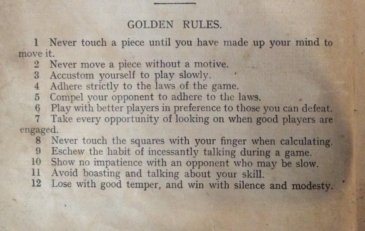
Check the last rule proposed to players over 100 years ago:
LOSE WITH GOOD TEMPER, AND WIN WITH SILENCE AND MODESTY
Amazing advice, I think!
And now I'd like to share my favourite problem. I like the fact Dr Marion Tinsley almost got stung with it, making for a connection to checker history.
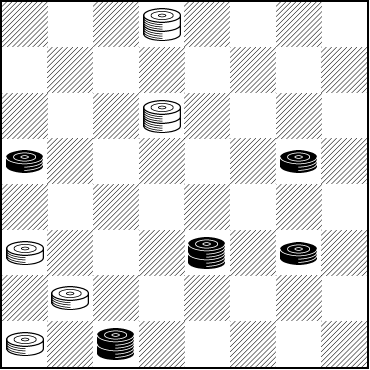
WHITE
White to Play and Win
W:W29,25,21,K10,K2:BK30,24,K23,16,13.
Can you solve Kookaburra's favorite (or should we say favourite) problem, one that gave pause to Marion Tinsley? It's not as hard as you might suspect. Don't be left out (back); give it your best and then click on Read More to see the solution.![]()
The Checker Maven is produced at editorial offices in Honolulu, Hawai`i, as a completely non-commercial public service from which no income is obtained or sought. Original material is Copyright © 2004-2026 Avi Gobbler Publishing. Other material is public domain, AI generated, as attributed, or licensed under CC1, CC2, CC3 or CC4. Information presented on this site is offered as-is, at no cost, and bears no express or implied warranty as to accuracy or usability. You agree that you use such information entirely at your own risk. No liabilities of any kind under any legal theory whatsoever are accepted. The Checker Maven is dedicated to the memory of Mr. Bob Newell, Sr.

